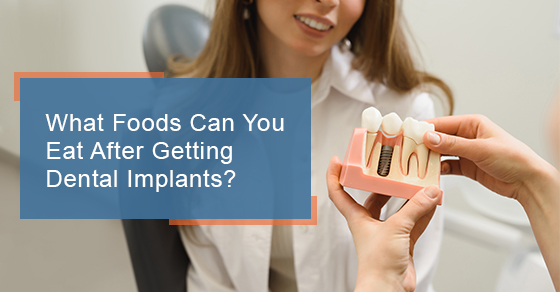Getting dental implants can be a major event in someone’s life. After all, this amazing solution restores the look of your smile and the function of your mouth.
As such, it’s critical to properly care for your implants after surgery. What you eat (and don’t eat) is of paramount importance.
Foods to Eat Immediately After Getting Dental Implants
As you are not permitted to eat six hours before your dental implant procedure, don’t be surprised if you wake up feeling hungry! However, you need to wait at least an hour before having your first snack post-surgery.
This is because the gauze sponges placed on your surgery site need to remain in your mouth for the first hour after surgery.
Once they are removed, go easy on yourself. The first 24-48 hours are crucial for your healing post-surgery. You may also be experiencing some discomfort and heightened sensitivity.
Starting one hour after your dental surgery and continuing for the next 48 hours, stick to the following diet:
First, you should only consume liquids. For example, we recommend drinking smooth cold soups (nothing chunky), broths, applesauce, meal replacement drinks, smoothies, protein drinks, and juices.
If you choose fruit smoothies or juices, do so sparingly. Fruit may be high in vitamin C (which is good for your gums), but it’s also highly acidic, and too much can damage tooth enamel.
Chewing will be difficult initially and can negatively impact your recovery. That’s why you must stick to liquids.
Second, do not drink your liquids through a straw or water bottle. Doing so requires suction, which can then put pressure on your implant site and disrupt clotting.
Third, all liquids must be cool. Avoid any hot foods or beverages. Soups may be a fantastic post-surgery meal; however, they must be served cold.
Fourth, do not drink alcoholic beverages or smoke.
Fifth, drink lots of water. Staying hydrated is an important part of your recovery. Furthermore, we recommend taking in more fluids after any procedure that uses general anesthesia.
Foods to Eat in the Weeks After Dental Implant Surgery
Once the first 48 hours are up, you can start introducing soft foods into your diet. The healing process has now started. However, you should still avoid chewing as much as possible.
As your gums heal, you can introduce more solid foods that require some chewing.
Every patient will have a slightly different healing journey. It’s important to monitor the sensitivity and tenderness of the surgical site in the days and weeks following your procedure.
Most patients can start carefully chewing near the implant site at the end of their first-week post-surgery.
A low level of discomfort is to be expected. However, pain is a sign that your mouth isn’t ready. You should wait to re-introduce chewier foods. If the pain continues, contact your dentist.
That being said, we recommend that most patients stick to a soft-food diet for the first 10-14 days. Eating foods that are high in protein and vitamin C will help your mouth heal faster.
Here are a few ideas:
- Cooked cereal grains are nutritious and easy to eat. For example, consider adding oatmeal or cream of wheat to your diet.
- Mashed, baked, boiled, or fried potatoes (or sweet potatoes) are also good choices during the first few weeks. Plus, they’re an easy way to add some variety to your diet. No crispy French fries though!
- Eggs such as scrambled, poached, or in an omelette are also great. They’re soft, high in protein, and rich in vitamin D.
- Dairy products like milk, yogurt, and soft cheeses offer valuable calcium, which is essential for strong teeth.
- Don’t forget about your greens. Cook leafy greens like kale and spinach until they’re soft and easy to chew.
- Initially, any meat you eat should be tender and soft. Soft-cooked fish like salmon, cod, or halibut are great options.
Foods to Avoid After Getting Dental Implants
Now that you know what you can eat (and when), it’s time to look into what you should avoid.
Do not eat the following foods:
- Crunchy foods (chips, hardshell tacos)
- Chewy foods (gummies, dried fruit)
- Sticky foods (taffy, candy)
- Spicy foods (salsa, hot peppers)
You should also avoid consuming large quantities of acidic foods even though, as we mentioned earlier, many acidic foods (like fruits) offer vital vitamin C.
Other Ways to Care for Your Dental Implants
Eating the right foods (and avoiding the wrong ones) is just one way to care for your dental implants. Don’t stop there, though!
Smoking and tobacco are two habits that are never good for your health. You place yourself at a higher risk for tooth decay, cancer, and other serious conditions.
Smoking is particularly bad for dental implants. It significantly slows down the healing process and weakens the gums around your implant.
In the initial few days post-surgery, put down your electric toothbrush and water-flossing device. Under normal circumstances, these tools are immensely beneficial for your oral health.
However, they are too vigorous immediately after dental implant surgery. Instead, gently use a traditional toothbrush and floss.
Need dental implants in Toronto?
Dental implants restore the look and function of your mouth after tooth decay, injury, or gum disease. It’s an incredible, permanent solution to your dental troubles.
Dr. Kostirko at Bloor West Smiles has more than 20 years of dental implant surgery experience. In just 30-40 minutes, he replaces your damaged or missing tooth with a durable and natural-looking implant.
If you’re looking for a dental implant clinic in Toronto, Dr. Kostirko and the entire team at Bloor West Smiles are happy to help.
To learn more about dental implant surgery in Toronto, call Bloor West Smiles at 416-766-2853 or contact us here.


Sorry, comments are closed for this post.